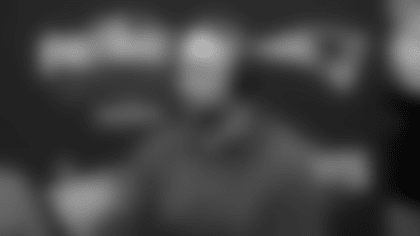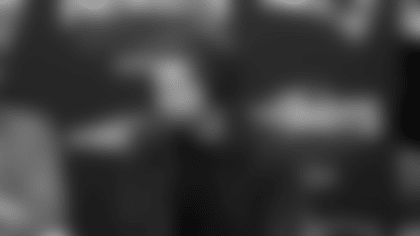HEAD COACH JEROD MAYO
PRESS CONFERENCE
May 29, 2024
Q: How are you doing today?
JM: Doing well. Excited to be back out here. Look, great weather. Guys are going to come out here and compete, so it's going to be a fun day.
Q: What are you working on?
JM: Everything. Everything. We're kind of getting into real football now, so first, second, and third down. We'll continue to just move that way. Next week we'll get into some other things, but first, second, and third down, now you have to put the sticks into it and building that awareness on both sides of the ball is important.
Q: You've had a few practices now with Drake Maye out there with the rest of the team, not just the rookies. How have you seen him progress in this short time?
JM: Look, he is taking advantage of the opportunities that he gets. And look, we're all being evaluated. I'm being evaluated, the players are being evaluated, and you know, hopefully everyone is open to feedback. Stacey just told me some things I did wrong the last time I was up here, so it's all good.
Q: When you talk about taking advantage of the opportunity, you have the four quarterbacks and how you divvy up the repetitions. Is there any concern that Drake's getting enough?
JM: No. My message is, it's not how many opportunities, it's what you do with the opportunities that you get. Look, going back to the competition part of it, the better you do on a day-after-day basis, not just on the field but also in the classroom, the more reps you'll get going forward.
Q: We're used to seeing the "Patriot Way," Bill Belichick's way of doing things. What are you doing, if anything, to establish your own culture, to build your own personality into this team?
JM: Honestly, I'll say in my opinion, I couldn't articulate what the "Patriot Way" is. I just know that hard work works, and that's how I looked at the "Patriot Way" is that we just worked harder than everyone else and I believe in that philosophy as well. So, we'll be out here working hard and look, you try to put the guys in difficult situations to see how they respond. You put them in the weight room, heavy weight on their backs, see how they respond, and try to build a tough, dependable football team.
Q: You've got some new coaches in on defense, you've got some old coaches still there. What has that process been like, kind of marrying the old system with the new guys?
JM: Honestly, it's been great. I feel like we have a good combination of old, young, player, non-player. But, at the end of the day, they all love football and they know how to articulate complex ideas and kind of simplify it for the players. So, you hit it on the head, there is a good mix of guys even that were here and that weren't here, you know. We brought in 17 new coaches, and I think those guys are doing a good job gelling with the rest of the staff, and it's a work in progress.
Q: Brian Belichick had his father leave, his brother leave, and he stays along. I don't know if it was awkward at all for him, but what has it been like having him stick around?
JM: He's been fantastic, he's been fantastic. There are other guys in the organization that it has been a little awkward for him, and those guys have handled it the right way. Look, Brian loves football, and he loves New England. I think I talked about this a little bit earlier: a guy, new baby, loves it up here, and wants to stay. We're happy that he's here.
Q: How do you stay authentically you out there on the field? Like, there's pressure, you get a promotion, you're under the spotlight, you might want to perform in a certain way. How do you stay yourself?
JM: Honestly, I mean, this is me. If you talk to guys that have known me over the years, look, I do change, I am still evolving, I'm evolving as a head coach. This isn't the final form of Jerod Mayo, the head coach. I have only been doing this now for a couple months, so we'll see how it is going forward, but at the core, I am a father, I am a husband, and I am a Christian. That's my core, and so those things won't change. Some of the philosophy things though – and it's not a dumb question, it actually is a good question – but some of the philosophy things, I am still kind of getting those in order and I think it's important that you talk to other coaches around the league. You guys know Tony Dungy was here. It was great having him here and just having those discussions outside of this silo, and it's been good.
Q: Have you been pleasantly surprised by anything or anyone at this point?
JM: I mean, that's hard to say. I think the guys, no matter what group we're talking about, and right now, I know you've heard this before, but there are no starters. Just being able to mix and match different groups, that's a hard one. Look, Keion [White] is doing a good job for us and I'd say also, Keion has kind of taken that step forward as far as being a leader. Not as much vocally, but you see him actually leading the groups and working well, so if you need a name, that is a good one.
Q: Why was Evan Rothstein (assistant quarterbacks coach) someone you wanted to keep on your staff and how would you describe his new role moving forward?
JM: Yeah, I don't know if it's a good or a bad thing, but Evan Rothstein has worked with a lot of first-year head coaches so he has the knowledge. He understands situational football and the rules of the game very well, and also, just football as a whole. Not only on the offensive side of the ball, but you know when he first got here he worked on the defensive side of the ball as well, so he has that research, analytics, hybrid coaching model. He has been a great resource, a great sounding board for me.
Q: At quarterback, you guys drafted Drake, you signed Jacoby [Brissett], you drafted Joe Milton III. How is Bailey Zappe handling that and is there space for Bailey Zappe?
JM: I would put him the same category that we talked about Brian [Belichick], how it's awkward for Brian and he's handled it well. The same thing for Zappe, I think he has handled it fantastically. Look, he is getting reps out here. You guys see him out here, and I would say he is getting better.
Q: You mentioned Tony Dungy coming through. What can you learn from him and what can your players learn from listening to what he has to say?
JM: I have always been a fan of Tony Dungy, even though the Patriots and the Colts have a little history. But from afar, [he's] just a guy who has won games, like big games as a championship-level coach. He does it the right way. It's not through cussing people out, or anything like that, which that works, I guess, with some teams as well, but it's through developing men and women. I kind of want to mirror that.
Q: You mentioned how you've tried to learn from other coaches, especially as a first-year head coach yourself. It's been a lot of talk about offense, but defensively, have there been any systems that have taken your eye a little bit as you try to evolve with your unit?
JM: Yeah, you know, honestly, it's a very interesting question. Defensively, we are always looking at new schemes, and I would also say, when we're scouting teams in college, we're also looking at schemes that are being run at colleges as well. Even going back to my rookie year, with the wildcat offense. I saw that in college with [Darren] McFadden and Felix Jones, and then it kind of matriculated its way up here to the NFL. It's the same thing now, where, "alright, what's coming down the pipe?" Not only defensively, but also offensively, like what can we expect coming down the pipe into the NFL ranks. So, I watch it all and we're a gameplan team, as I always say, and we're going to do what is best for our team to win games.
Q: You mentioned Keion White a minute ago as someone if we needed a name for someone that has kind of impressed you so far. Can you just expand a little bit upon, you kind of mentioned how he has taken that step forward? What do you mean by that?
JM: Yeah, look, his versatility, he's always been a strong guy but I would say he is even stronger now and he is doing a good job. He is here each and every day, and in the meeting rooms, he is actually kind of talking and leading those conversations, which I think is important. And we always talk about that Year 2 jump, that's the biggest jump you're going to have.
Q: You mentioned earlier that Bailey is out here getting reps. Did those reps, obviously you guys have practiced since we were here last, has the way in which those quarterback reps have been distributed changed a lot since that first day?
JM: You would hope by the end of the spring that everyone has had a significant amount of reps where you can evaluate those guys. Look, you guys aren't out here every day, we kind of give you a snapshot and I think you bring up a good point. But, every practice is its own.
Q: Are there ways to get somebody like Drake more reps that aren't out here on the field with him behind center? Do you subscribe to "more is better" for a young guy, or does that hit a certain point where you say that it's too much?
JM: Yeah, in my opinion, it's a case-by-case basis, but I would also say, it's not only what is done out here on the football field. I know that when we talk about meetings, we usually talk about sitting at a desk and taking notes, but we have spaces inside the building where you can actually go out there and get real-life looks at the defenses and go through the calls with coaches, so he'll get his reps.
Q: Is that virtual reality? I only ask because Eliot Wolf mentioned something yesterday on a radio show about that.
JM: Yeah, look, the virtual stuff is great and that's another way that you can steal some of those reps without being on the football field. And absolutely, we're interested in that type of technology, we have rooms in the building that have some of that technology. Obviously, technology changes every single day. We're looking for the best thing.
Q: With Drake, you've stumbled upon him studying film by himself or that he is hard at work. Are there any other examples about things that you have observed about him that impressed you or surprised you so far?
JM: I wouldn't say surprised me. We spent an extraordinary amount of time looking into Drake and his past and his family and things like that, so I wouldn't say surprised me. This is what we expect from a guy that we think has the potential to be a very good player in this league.
Q: A long way out obviously from roster makeup and building your team, but philosophically, the Patriots have large nucleuses of core special teamers. A couple of those guys have retired or been let go. What is your general philosophy now and how will this new kicking rule change affect that?
JM: Yeah, one thing I would say about the leadership on special teams is that we still have Joe Cardona, we still have Matt Slater in the building. I know he is not running down there on punts anymore, but it is still good to have him there. I would also say, a guy like [Brenden] Schooler, he is another person I would put in that same bucket, someone that has surprised me. I have had conversations, like, "let's start to take that step forward." Not only going out there and making plays on the field, but also getting the guys together and building that camaraderie with the group. So, School [Brenden Schooler] and Cardona, those guys are going to do a good job for us leading those units.
Q: How so, in Schooler's case?
JM: Well, first of all, we know he plays hard each and every down. He is out there each and every time there is a special teams snap. I think that is the most important thing. It's hard to lead when you're not out there on the field. Look, I was a captain for seven years. I had a couple IR years, and it's very difficult to lead if you're not out there on the field. I would say attendance, and look, he's a great athlete in the weight room, always pushing guys to go forward. And then, really just helping with the younger guys on the special teams unit.
Q: There is a Players' Association proposal to modify the offseason program and start training camp in mid-June and get rid of OTAs. What are your thoughts on that?
JM: Yeah, honestly, in these stages, it's just a proposal and this is exactly what they want to happen, us having this conversation right here. One thing I will say though, and I truly believe it, the athletes, no matter what sport they are talking about, they have to take accountability for their career. And anytime you push that back like that, you're going to start to lose some of those guys that don't have the discipline early on in their careers to really stay in shape. So, if you think you're going to come there later and everyone is going to be in shape, I just don't foresee that, but I don't have a fortune teller.
Q: Going back to special teams, someone that struggled a lot last year was Chad Ryland. What have you seen from him in these early stages? What is his mentality?
JM: His mentality is that it is a new year. We always talk about changing the page, we always talked about that the past ten years, whatever, changing the page. I think he has done a good job of that. Look, we have new coaches as well, and so they are working with him, not only on his technique, but building that confidence and that starts right now.
Q: How has the adjustment process been for [Dont'a] Hightower in his new role as a coach now?
JM: It's funny you say that, you know, he came to me this morning asking for advice, and I was like, "welcome to coaching." As much as you think it's about X's and O's and getting guys to play hard for you, it's also a leadership role. I mean, I'm a huge believer in you manage processes, you don't manage people, you lead people. We bounced some ideas off of each other but he has to come up with his own philosophy in the way he deals with things, so it's been good for him. He should apologize to me, when I coached him, he kind of gave me those same headaches.
Q: How has your relationship and rapport changed with DeMarcus Covington in your new roles?
JM: We've had a great working relationship, and even a great relationship off the field, and even our families. We see things the same way, for the most part, and there are also things where you've got to have those conversations and come to a final conclusion. I think he understands that, but once again, we'll see as we kind of build into real football, like how it works out. But right now, it is going well.
Q: How closely have you been following [the Celtics]? And is there anything you can learn, in your job, from them in terms of how they built the team or how they have grown over the last few years?
JM: It's interesting. First of all, I root for all Boston teams. Second of all, I would say, I have known Joe [Mazzulla] before he was the head coach of the Celtics and that kind of happened in not a traditional way. But at the same time, he was out here for two summers when he was just an assistant coach, so we've had that relationship and always stayed in contact. We talk ball, we talk about how to deal with the people. At the end of the day, it's all about the people. He has been a great resource for me. Go Celtics! Take care.







































